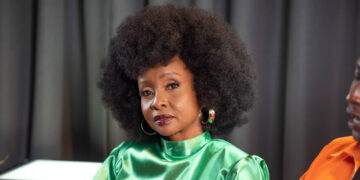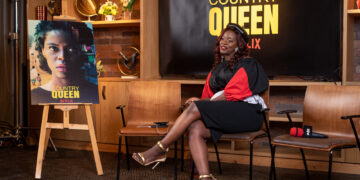Country Queen premiered on 15 July 2022. It is Kenya’s first homegrown Netflix series, a historic event and a step forward in the country’s film and TV industry. Accordingly, it shall hold a sentimental spot in the hearts of Kenyans; at least in those with sentimental hearts anyway. I provide this disclaimer purely to acknowledge the accomplishment. What worked and what didn’t work throughout the six episode freshman season reads like duplicate lists. What the filmmakers got right were the ideas and themes, timely and criminally overlooked, and where they failed, were the devilish details in these ideas and themes.
The show centres around an event planner by the name of Akisa (Melissa Kiplagat, This Is Life), who travels to her rural home of Tsilanga after hearing news of her father’s sickness. Upon her arrival, the patriarch suddenly passes away, which sets off a battle of wills between Akisa and her scheming uncles. These battles include but are not limited to: the portion of land Akisa’s father left behind, the location of his grave, and expectations of women when traditions come into play. These are the themes we face on our day to day lives, and they’re finally being represented on screen.
And there’s plenty more good the show does. Firstly, it looks great; visually. The production value on display here is world class. Truly, this is Netflix budget territory. Local filmmakers are becoming a lot less comfortable delivering television of lesser quality. In this regard we should continue, not only to churn out material on par with world market releases, but to exceed them. And right there is where the similarities and aspirations to international series and films should stop. Country Queen is a fun show, a pulpy drama that I think takes itself a little too seriously where it ought to embrace the wackiness it inadvertently exudes.

Take the actors for instance, a formidable ensemble. All of them are absolutely killing it at their job. Kiplagat, nailing the lead role of the event planner and up-country daughter, essentially thee ‘Country Queen’; Melvin Alusa (Salem), playing the pseudo revolutionary, Kyalo, so dumb a character your heart cries out, and Alusa certainly plays the dumb out of Kyalo; Nini Wacera (Desperate Housewives Africa), completely understanding the script they were shooting and hamming it up with more grace and beauty than a latexed Gal Gadot; and Blessing Lung’aho (Igiza), just being the coolest guy in every room, even when that room is literally a jail cell. All of these actors are tremendously good, including the sturdy supporting cast. They may even perhaps be too good for the material they were working with.
What they got right was the idea they had for the script; the story they wanted to tell. What they got terribly wrong was the script itself. It’s a wonder how pleasantly watchable Country Queen is with all the cockamamie things that are happening, being said, and going on in it. There’s that value for your money, production money, that’s bound to, in turn produce you money. Keep at it. But consider the possibilities of a tighter script. The skeleton of Country Queen is interesting enough, the stuff of dinosaurs, but the tissue is worn out donkey. Breaking the rules is acceptable if you have a better idea. A few very important characters get introduced with no panache at all, you’d think an extra got promoted mid-shoot. The scenarios are largely trite, and bear disturbing resemblance to what we see from international life. If the writing were any better it may even be accused of plagiarism. The dialogue is cringey, it’s inconsistent, it lacks dramatic control; things that are not necessarily bad if they hadn’t been overtaken by the good acting. It really sucks when everyone in a team is working at a certain level and everything loses balance the moment one presents their portion. It’s strange that the fault in this equation was the very first symbol in it, the entity to ignite them all, the almighty script, in this case the secret ingredient to mediocrity.

All that jazz has the makings of a corporate ‘project’, in which a script followed, after a figurative green light was given. The B story, a classic gangster staple in which someone loses a bit of money and is forced to find it within a certain period of time. Well, that’s exactly what happens here, except, except here the party responsible for retrieving the money is the husband to the party that is making the threats. How pulpy, in total odds to the realism of the Akisa’s Tsilanga sections. Nini and Lung’aho play this couple extraordinarily well. I can tell because their rousing kiss scene is stirring in a morbid way. I almost looked over my shoulder with a sinister smile. It’s like watching Lady Macbeth and Macbeth make out in a palatial modern condo. However, they don’t belong in this country. I don’t believe half the stuff that comes out of their mouths, nor the things they do. For instance, Max (played by Lung’aho) going to a Congolese ghetto the way he did and not getting murdered. Hell, that his street credibility even stretches all the way to Congo is questionable. I rather doubt Africa works that way, with the same interconnection between disparate states like American mafia. It’s an insincere plot line, it feels false.
In order to be edgy, I suppose, the writing department just chose to follow what’s prevalent in American television and films these days; anti heroes. Simply put, placing morally reprehensible characters as the leads in a show is very ‘in’ right now. It’s trending for a reason, it certainly hits a pulse with the zeitgeist. But the line between transcendent and ridiculous is very thin, and for Country Queen, it was crossed with yards to spare. Akisa, whom we’re supposed to like, is a little unlikable herself. She’s mean to her own employees at work, she yells at them, she’s having an affair with a married man, she keeps making the wrong decisions; it’s too much to overlook. Or maybe not; how many of us have not overlooked more in people or things that have brought back certain feelings we lost? Perhaps since we were talking firsts, it’s justified to get out the ‘Kenyan versions of these and those’ for a while now. But as far as that goes, this is still a pretty paltry attempt at a popular socially relevant series.

The ideas and the themes make absolute sense on reading the synopsis, one would definitely want to watch Country Queen, but after coming out at the end of episode six, only a slight portion of that promise is delivered. We find out that Nini’s character, Vivienne Sibala, has a son in a confusing sequence in which she’s tied up and he’s talking to her like a fiend. At that point we think he’s some thug or other, only later to keep turning up and the audience, who by years of conditioning and the derivative nature of this story, rightly assume that he is her son. Finally the show reveals their damn cards; he’s her step son. But with an evil druggy Bruce Wayne complex like that, how much should we care, really?
We’ve been here, we’ve seen this. It would have been forgivable had it been better written, nay, it would have been astounding. It certainly is a blow, because despite all the technical feats—such as the dazzling one shot scenes of Akisa planning an event and a funeral—which have now been reduced to artificial dressing, there’s no soul to it. Vincent Mbaya directed most of Country Queen’s episodes, but the German producers had a direct hand in a lot of the creative decisions, and no doubt contributed to a fair share of the mess. The show does have at least one or two interesting cliff hangers working for it, so here’s to hoping for a better season two. I should say, that above all, its triumph remains in the experience of watching a long form show so deeply close to home on the world’s leading streaming service. Whatever it lacks in narrative emotional power, and others, it at least makes up for in chutzpah. It has my sentiment.
Country Queen is available to stream on Netflix.
Enjoyed this article?
To receive the latest updates from Sinema Focus directly to your inbox, subscribe now.












Excellent review. I think you write the best reviews I have read in this part of the world. Your perspectives resonate a lot. Keep the good work!